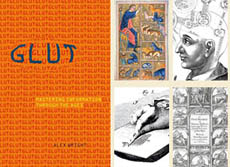Neo-bohemian rhapsody
November 17, 2005
My cousin-in-law Andrew O'Hehir has written a fascinating take on Richard Lloyd's new book Neo-Bohemia: Art and Commerce in the Postindustrial City, a piercing critique of the popular mythology surrounding American urban bohemias like the Mission, Greenwich Village, and Chicago's Wicker Park.
That old bohemia never really existed, except in our dreams. But those dreams hold a cultural mythology far more potent than any actual Bohemia. Just a few weeks ago, a friend from Brooklyn was telling me how Williamsburg is "over" now that the yuppies are moving in. Turns out it was over the moment it began.
Tags: bohemians, andrew_o'hehir, richard_lloyd, san_francisco
File under: Books
_____________________« If it's Tuesday, this must be Vermont | Secession, seriously? »
GLUT:
Mastering Information Through the Ages
New Paperback Edition
“A penetrating and highly entertaining meditation on the information age and its historical roots.”
—Los Angeles Times
